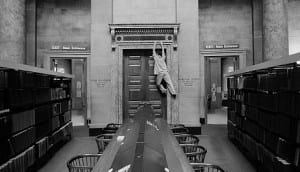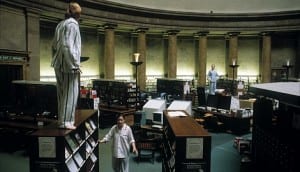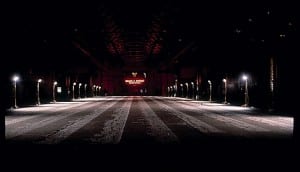Whilst in the process of creating a site specific performance I have chosen to research into Forced Entertainment and their site specific work. Through researching into their methods of work I hoped to find material that would possibly influence the creative decisions when constructing my final site specific piece.
I started my research on Forced Entertainment through visiting their website: http://www.forcedentertainment.com in order to get an outline of their past performances, before further researching into their site specific work.
An Introduction to Forced Entertainment
Forced Entertainment is a Sheffield based Theatre Company made up of six artists, including their Artistic Director Tim Etchells. The company was created in 1984 and has produced a multitude of different projects and performances of varying styles and genres.
On Forced Entertainments website they describe some of their own work by saying they have “made lists, played games, spoken gibberish, stayed silent, made a mess, dressed up, stripped down, confessed to it all, performed magic tricks, told jokes, clowned around, played dead, got drunk, told stories and performed for six, twelve and even 24 hours at a stretch” (Corporation Pop, 2016)
Site Specific Performances
Forced Entertainments’ first large scale site specific project titled Dreams’ Winter, was performed within the Manchester Central Library building.

The piece was created in 1994 and responded directly to the site by using features of the buildings architecture within the performance. “Much of the performance made use of the whispering gallery acoustic of the space whereby conversations or sounds from one side of the room can be heard crystal clear on the other” (Corporation Pop, 2016).

This piece shows how the use of space and features of a specific site can be incorporated into the performance and allows the site to become part of the piece rather than merely the location facilitating the performance.
Another site specific performance I researched was Forced Entertainments’ Nights in this City. The project was created in 1995 and first based in Sheffield, but was later relocated to Rotterdam. The piece consisted of a ‘misguide’ wherein the audience were bussed around and told both true and false information about their surroundings in order to explore “the different histories written in urban space — from the official and the historical to the personal, the mythical and the imaginary” (Corporation Pop, 2016). The piece ended with an installation, featuring a map of the city drawn out in chalk.

This site specific project displays how Forced entertainment responded to space and created a performance which challenged the audience’s assumptions and possible recognition of spaces and places on a city wide scale.
Actor Audience Relationships
When researching into Forced Entertainments actor audience relationships within their work I looked into an interview with Tim Etchells by journalist Dagmar Walser, extracts of which have been documented upon Forced Entertainments website: http://www.forcedentertainment.com/notebook-entry/what-is-the-audiences-role-in-a-performance/.
Within this interview Walser asks questions such as “If there were a tangible contract between the performers and the audience, what in your opinion is the most important thing this contract would include?”. Tim Etchells responded to this question, outlining Forced entertainments relations with their audience through explaining that “the most important thing as an audience member is an openness to being there” (Corporation Pop, 2016). This quote displays how Etchells believes the contract between audiences and actors goes both ways, meaning that the audience have a significant role in the performances, in the sense that they are key to receiving the performance, signifying that their pieces are driven largely by attempting to evoke certain reactions from audiences, or by addressing audiences directly.
Documentation of/and Access to their work:
A majority of Forced Entertainments work has been documented their website and can be freely accessed. However within Graham Saunders book British Theatre companies 1980-1994, Saunders describes how “one might expect to find the experience of attempting to chart [Forced Entertainments’] history rather daunting. An enormous amount of labour has been dedicated to documenting, recording and analysing Forced Entertainment’s work: so much so that any formal attempt to construct a history will be inevitably limited and partial” (Saunders, 2015).
This quote describes how although documented on a publicly accessible website, for a company that’s been creating work for over thirty years it’s difficult to understand the full amount of effort that went into each piece through merely a summary, displaying how all the groups works and labour is not fully reflected. Despite this, the documentation still gives people an overview of Forced Entertainments work which functions to showcase their previous performances and promote their future work.
Overall I’ve found the task of researching Forced Entertainment helpful in the creative process of making a site specific piece. Through analysing their methods of working and how they approach space and incorporate audiences, I believe I have found aspects of their work I wish to include in my final piece.
Works Cited:
Corporation Pop (2016) Forced Entertainment. Available from http://www.forcedentertainment.com/ [accessed 25 February 2016].
Saunders, G. (2015) British theatre companies 1980-1994 : Joint Stock Theatre Company, Gay Sweatshop, Théâtre de Complicité, Forced Entertainment, Women’s Theatre Group, and Talawa. London: Bloomsbury Methuen Drama.